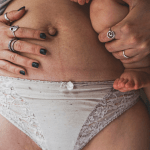Introduction to Postpartum Recovery
Understanding the Postpartum Period
The postpartum period, often referred to as the “fourth trimester,” is a time of significant physical and emotional change as a woman’s body recovers from childbirth. This phase typically encompasses the first six weeks after delivery, but recovery can extend well beyond this timeframe. During this period, new mothers may experience a range of symptoms, from vaginal discharge and perineal pain to hormonal fluctuations and emotional adjustments. Recognizing that the postpartum journey is unique for each individual is crucial, as recovery times and experiences can vary widely.
Setting Realistic Expectations for Recovery
It’s essential to set realistic expectations for postpartum recovery. The notion that women should “bounce back” to their pre-pregnancy state within six weeks is not only outdated but can also be harmful. Recovery is not a race; it’s a gradual process that should be approached with patience and self-compassion. Factors such as the type of delivery, the presence of complications, and individual health conditions all play a role in the timeline for healing. Understanding that it may take several months to a year to fully recover can help mitigate feelings of frustration and encourage a more gentle approach to postpartum care.
The Importance of a Chemical-Free Recovery Environment
A chemical-free recovery environment is vital for the health and well-being of both mother and baby. Minimizing exposure to harmful substances, such as harsh cleaning agents, personal care products with toxic ingredients, and certain medications, can support the body’s natural healing process. Opting for natural, non-toxic alternatives can help ensure a safer environment for recovery and breastfeeding, and contribute to long-term health benefits for the family.
Overview of the Article Structure
This article is structured to guide new mothers through the stages of postpartum recovery, providing insights and practical advice for each phase. We will explore the immediate postpartum recovery during the first six weeks, the extended recovery phase from six weeks to three months, and the gradual return to strength and stamina from three to six months. We’ll also discuss stabilizing and thriving from six months to one year and the ongoing care considerations beyond one year. Each section will address physical healing, emotional well-being, nutrition, exercise, and the importance of a chemical-free lifestyle. By the end of this article, readers will have a comprehensive understanding of the postpartum recovery timeline and the tools to navigate this transformative period with confidence and care.
The First Six Weeks: Immediate Postpartum Recovery
Physical Changes and Healing
After childbirth, the body begins a natural process of healing and returning to its pre-pregnancy state. This period is critical for physical recovery, and it’s important to understand that healing takes time. For those who had a vaginal delivery, soreness and perineal healing are common concerns. It may take three to six weeks for a perineal tear or episiotomy to heal. Using ice packs, warm sitz baths, and avoiding prolonged standing or sitting can aid in recovery. For C-section deliveries, the incision site requires careful attention to prevent infection and promote healing. Pain management, gentle activity like walking, and avoiding heavy lifting are key during this time.
Emotional Well-being and Hormonal Balancing
The postpartum period is also a time of significant emotional adjustment and hormonal shifts. Feelings of joy can be mixed with fatigue, anxiety, and mood swings due to rapid hormonal changes. It’s common to experience the “baby blues,” but if feelings of sadness or hopelessness persist, it may be a sign of postpartum depression, and professional help should be sought. Support from partners, family, and friends, along with adequate rest, can greatly benefit emotional well-being.
Nutrition and Hydration for Healing
Proper nutrition and hydration play a vital role in postpartum recovery. A balanced diet rich in vitamins, minerals, and fiber supports tissue repair and overall health. Breastfeeding mothers may need additional calories and should focus on nutrient-dense foods. Hydration is equally important, especially for lactation support and preventing constipation. Aim for at least 64 ounces of water daily and limit caffeine and alcohol intake.
Rest and Sleep Considerations
Rest is crucial for recovery, yet new mothers often face disrupted sleep patterns due to the demands of newborn care. It’s important to sleep when the baby sleeps and accept help to ensure you can rest. Proper sleep supports physical healing, emotional stability, and can improve the effectiveness of the immune system during this demanding time.
Remember, every woman’s recovery is unique, and it’s essential to listen to your body and consult with healthcare providers regarding any concerns during this period. Patience and self-care are key to a healthy and successful postpartum recovery.
Six Weeks to Three Months: Extended Recovery Phase
Continued Physical Healing and Exercise
As you transition from the immediate postpartum period into the extended recovery phase, your body continues to heal and adapt. Physical healing, particularly for those who experienced a perineal tear or a cesarean section, may still be underway. It’s essential to listen to your body and progress with exercise gradually. Engage in activities that enhance circulation, promote wound healing, and restore muscle function without causing discomfort or strain. Gentle pelvic floor exercises and low-impact activities like walking can be beneficial. Consult with a healthcare provider or a physical therapist to tailor an exercise program that supports your recovery.
Breastfeeding and Its Impact on Recovery
Breastfeeding is a significant factor in postpartum recovery. It influences hormonal balance, which can affect physical healing and emotional well-being. Lactation demands extra calories and hydration, so ensure you’re consuming a nutrient-rich diet and plenty of fluids. Breastfeeding can also lead to postural changes, so incorporate exercises that strengthen the upper back and alleviate tension in the neck and shoulders. Remember, every breastfeeding journey is unique, and it’s okay to seek support from lactation consultants if challenges arise.
Mental Health and Coping Strategies
The postpartum period can be emotionally challenging. Fluctuating hormones, sleep deprivation, and the demands of caring for a newborn can impact your mental health. It’s crucial to develop coping strategies, such as mindfulness, deep breathing exercises, or journaling, to manage stress and anxiety. Don’t hesitate to reach out for professional help if you’re experiencing symptoms of postpartum depression or anxiety. Building a support network of family, friends, and other new parents can also provide emotional comfort and practical assistance.
Reconnecting with Your Partner
Reestablishing intimacy with your partner after childbirth takes time and patience. Open communication about your physical and emotional readiness is key. Start with non-sexual forms of intimacy, like cuddling or massage, to rebuild the connection. When you both feel ready, gradually reintroduce sexual activity, keeping in mind that comfort levels and libido may vary. If you encounter challenges, consider consulting a therapist who specializes in postpartum sexual health.
Remember, the journey through the extended recovery phase is not a race. It’s a time to honor your body’s pace of healing, nurture your mental health, and strengthen the bond with your loved ones. With patience and self-compassion, you’ll lay the foundation for a resilient and fulfilling postpartum experience.
Three to Six Months: Regaining Strength and Stamina
Building a Sustainable Exercise Routine
As you transition into the second quarter of your postpartum journey, it’s time to focus on building a sustainable exercise routine. Begin by setting achievable goals and gradually increasing the intensity of your workouts. Incorporate a mix of cardiovascular exercises, such as brisk walking or swimming, with strength training that targets major muscle groups. Remember to include core-strengthening exercises, like modified planks and side bridges, to support your abdominal muscles, especially if you’re recovering from diastasis recti. Always listen to your body and consult with your healthcare provider before intensifying your routine.
Weight Management and Body Image
Weight management postpartum is a common concern, but it’s essential to approach it with patience and self-compassion. Your body has undergone significant changes, and it’s unrealistic to expect a rapid return to your pre-pregnancy figure. Focus on a balanced diet rich in nutrients and engage in regular physical activity that you enjoy. Embrace the changes in your body as evidence of the incredible process you’ve been through, and remember that a healthy body image is about more than numbers on a scale.
Sexual Health and Intensity Postpartum
Resuming intimacy after childbirth is a personal decision and can be influenced by physical and emotional readiness. It’s normal to experience changes in libido and vaginal dryness, especially if you’re breastfeeding. Communicate openly with your partner about your comfort levels and consider using a lubricant if needed. Kegel exercises can also help strengthen pelvic floor muscles, potentially enhancing sexual function. Give yourself grace as you navigate this aspect of your postpartum recovery.
Holistic Approaches to Energy and Wellness
Regaining energy and wellness postpartum can benefit from a holistic approach. Incorporate practices such as yoga, meditation, and deep-breathing exercises to reduce stress and improve mental clarity. Pay attention to your nutrition, ensuring you’re getting enough calories, especially if breastfeeding, and continue taking prenatal vitamins as recommended by your healthcare provider. Embrace a chemical-free lifestyle by choosing natural, non-toxic products for yourself and your baby. By nurturing your body, mind, and spirit, you’ll support a more vibrant and resilient recovery.
Six Months to One Year: Stabilizing and Thriving
Long-term Hormonal Balance
As you approach the six-month mark postpartum, your body has undergone significant hormonal shifts. Achieving long-term hormonal balance is crucial for your overall well-being. Estrogen and progesterone levels begin to stabilize, but breastfeeding can continue to influence hormones like prolactin and oxytocin. It’s essential to monitor your menstrual cycle, as it can provide clues to your hormonal health. If you experience irregularities or symptoms such as persistent fatigue, mood swings, or hair loss, consult with a healthcare provider to address potential hormonal imbalances.
Establishing a Chemical-Free Lifestyle
Creating a chemical-free environment is beneficial for both you and your baby. Start by choosing organic, whole foods to minimize exposure to pesticides and additives. Opt for natural cleaning products and personal care items that are free of harmful chemicals. This not only supports your recovery but also ensures a safer space for your baby to grow and explore. Additionally, consider the use of glass or stainless-steel containers over plastic to reduce exposure to endocrine disruptors like BPA.
Maintaining Mental Clarity and Emotional Stability
Mental clarity and emotional stability are vital during this phase. Postpartum depression and anxiety can surface even many months after childbirth. It’s important to seek support if you’re feeling overwhelmed. Engage in activities that promote mental well-being, such as mindfulness meditation, gentle yoga, or journaling. Prioritize sleep and rest whenever possible, as they are foundational to mental health. Remember, self-care is not selfish; it’s necessary for you to be the best parent you can be.
Navigating Partnership Dynamics
The dynamics of your partnership may have shifted significantly since the arrival of your baby. Communication is key to navigating these changes. Discuss expectations, share responsibilities, and make time for each other. It’s also important to maintain intimacy, which can be challenging during this time. Be patient with each other and seek counseling if needed to strengthen your relationship. Remember, a strong partnership provides a stable foundation for your growing family.
By focusing on these areas, you can create a nurturing environment that promotes a healthy and joyful transition into the second half of your first postpartum year. Embrace this time of growth and change, knowing that you are laying the groundwork for a thriving future for both you and your baby.

Popular Read: Endocrine Disruptors in Skincare: What You Need to Know
Beyond One Year: Ongoing Care and Considerations
Continued Physical and Emotional Health
As the one-year mark postpartum approaches, many mothers find that their journey of recovery and adaptation continues. Physical health remains a priority, with a focus on sustaining the strength and stamina regained in the previous months. It’s essential to maintain a routine that includes cardiovascular fitness, strength training, and flexibility exercises. Emotional health is equally important, with mothers encouraged to seek support for any lingering postpartum mood issues and to continue to nurture their mental well-being through stress-reduction techniques, such as mindfulness and self-care practices.
Detoxification and Avoiding Endocrine Disruptors
Detoxification is an ongoing process aimed at reducing the body’s burden of harmful chemicals. Mothers are advised to be mindful of endocrine disruptors—substances that can interfere with hormonal balance—found in many household products, plastics, and personal care items. Opting for natural, chemical-free products and consuming organic foods when possible can help minimize exposure. Regular physical activity and hydration also support the body’s natural detoxification systems.
Aging Gracefully: Managing Changes Over Time
As mothers move beyond the first year postpartum, they may notice changes in their bodies as they age. Embracing these changes with a positive mindset is key to aging gracefully. Maintaining bone density through weight-bearing exercises, ensuring a diet rich in calcium and vitamin D, and regular health screenings are proactive steps to manage the natural aging process. Skincare routines and sun protection also contribute to long-term skin health.
Support Networks and Community Resources
Building and maintaining a robust support network is crucial for ongoing care. This network may include family, friends, healthcare providers, and community groups. Local parenting groups, online forums, and postpartum exercise classes can offer camaraderie and understanding. Community resources such as libraries, community centers, and health clinics often provide programs and workshops that can be invaluable as mothers navigate the complexities of parenting beyond the first year.
Conclusion: Embracing the Postpartum Journey
In conclusion, the postpartum journey does not end after the first year; it simply evolves. Mothers are encouraged to continue prioritizing their physical and emotional health, to be vigilant about environmental toxins, to embrace the natural aging process, and to lean on their support networks. By doing so, they can thrive in their role as mothers and as individuals, setting a strong foundation for the years to come.
By the way, something for you, a little gift!!!
I am just in the middle of publishing my book. It’s about How women can balance their hormones. One part is about food and diet, of course.
Follow this link and enter your email.
I will send you this part of the book for free once the book is published. It has many concrete, practical tips and recipes and will help you feel better during menopause or times of Big hormonal fluctuations.
Annette, Damiva Lead for Health & Wellness

Conclusion: Embracing the Postpartum Journey
Summarizing Key Recovery Milestones
The postpartum journey is a deeply personal and transformative experience that varies for every new mother. It’s important to recognize and honor the key recovery milestones that mark this period. Initially, the body undergoes significant physical changes and healing, especially in the first six weeks. Emotional well-being and hormonal balancing are also crucial during this time. As weeks progress into months, extended recovery includes continued physical healing, mental health support, and the reestablishment of intimate relationships. By three to six months, many mothers begin to regain strength and stamina, and by six months to a year, the focus shifts to stabilizing and thriving in the new normal.
The Role of Personalized Care and Self-Compassion
Every mother’s postpartum recovery is unique, and personalized care is essential. It’s important to listen to your body and seek guidance tailored to your specific needs. Self-compassion is equally vital; it’s okay not to rush the recovery process. As Stephanie, an exercise and training expert, reminds us on the Sense by Meg Fora podcast, it took nine months to grow a baby, so it’s unrealistic to expect to “bounce back” in a fraction of that time. Embrace your journey with patience and kindness, and remember that self-care is not selfish—it’s necessary for both you and your baby.
Final Thoughts on a Chemical-Free, Healthy Lifestyle
Adopting a chemical-free, healthy lifestyle is beneficial for both mother and child. Minimizing exposure to harmful substances and endocrine disruptors contributes to long-term health and well-being. Emphasize the importance of clean eating, using natural products, and creating a safe environment for your family. As you navigate the postpartum period, consider the impact of your choices on both your recovery and your baby’s development. By making informed decisions and prioritizing a healthy lifestyle, you set the stage for a thriving and resilient family life.
In conclusion, the postpartum journey is a time of immense change and adaptation. By acknowledging the key recovery milestones, practicing personalized care and self-compassion, and committing to a chemical-free lifestyle, you can navigate this period with grace and strength. Embrace each step of the journey, knowing that with time, support, and self-care, you will not only recover but also flourish in your new role as a mother.











